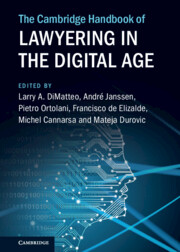Book contents
- The Cambridge Handbook of Lawyering in the Digital Age
- The Cambridge Handbook of Lawyering in the Digital Age
- Copyright page
- Contents
- Detailed Contents
- Figures
- Contributors
- Preface
- 1 Lawyering in the Digital Age
- Part I Effects of Technology on Legal Practice
- Part II Legal Tech and ADR
- Part III Legal Tech in Consumer Relations and Small Claims
- Part IV Legal Tech and Public Law
- Part V Legal Ethics and Societal Values Confront Technology
- Part VI Fate of the Legal Professions
1 - Lawyering in the Digital Age
Published online by Cambridge University Press: 18 November 2021
- The Cambridge Handbook of Lawyering in the Digital Age
- The Cambridge Handbook of Lawyering in the Digital Age
- Copyright page
- Contents
- Detailed Contents
- Figures
- Contributors
- Preface
- 1 Lawyering in the Digital Age
- Part I Effects of Technology on Legal Practice
- Part II Legal Tech and ADR
- Part III Legal Tech in Consumer Relations and Small Claims
- Part IV Legal Tech and Public Law
- Part V Legal Ethics and Societal Values Confront Technology
- Part VI Fate of the Legal Professions
Summary
Digitalization and the development of automated systems, as well as the evolution of artificial intelligence (AI), have radically changed the legal landscape and will continue to impact law at an accelerated pace. These developments have led to the creation of a new industry, legal tech (LT), which aims at creating technological applications specifically tailored for law and the legal market. LT includes a broad range of applications: some of the most prominent and recurrent examples include automation in the drafting of contracts, “mining” case-law, or the creation of smart dispute resolution systems not requiring human intervention. As a result, operations that were previously unthinkable, or that would demand an enormous amount of human resources, can now be readily done through numerous legal services available to lawyers, other professionals, and consumers.1 The rise of LT has brought about various responses, from those who advocate the innovating potential of LT2 to legal traditionalists that consider the replacement of human resources by technology to be highly disruptive.3 In addition, there are those who advocate for a level-headed distinction between “hype” and reality.4 Nonetheless, it would be shortsighted not to see that the advancement of LT is going to have a profound impact on the legal sector, in a degree similar to that which industrialization had on manufacturing.
- Type
- Chapter
- Information
- Publisher: Cambridge University PressPrint publication year: 2021
- 1
- Cited by

